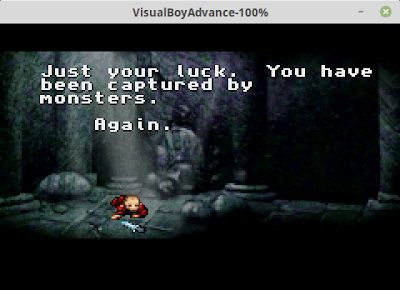I've somewhat hinted at it a few years ago, but there's a few reasons:
Nostalgia is one piece of it. I grew up playing Atari and NES, and so the idea of being able to make a quality game for the system I grew up with is really fun. As a kid, I wondered what it was like to make games for these systems, and spent hours sketching game designs on paper. It's fun to finally get to do what I dreamed about back then. (I've wanted to make a NES game ever since the system first came out. After 30 years of preparation, I finally feel like I can pull it off!)
Another factor is the challenge, and how different it is from my day-to-day work programming. I like programming, but the change of being so close to the hardware is a nice change.. The problems are somewhat similar to what I might solve at work, but really different in actual code. And learning how new (old) video game systems work is not only a fun challenge, but also interesting from a history/nostalgia persepctive. (ie "oh, THAT'S how and why they did that on that game!"). Add in some crazy limitations (only 76 processor cycles per scanline!?) and you have a good fun technical challenge.
Really, the biggest reason, though, might be about the community involved. For modern platforms (PCs, phone games, etc), the indie market is incredibly flooded right now. There are tons and tons of games being created all the time. While there are a few crazy success stories like flappy bird, the vast majority of indie games don't really ever get noticed. So you either pick a goal of just trying to be financially profitable (which requires more commitment than I'm willing to make right now, and a team of artists, musicians, etc), or just be happy making a goofy little game for the fun of it (which is what I did with Robo-Ninja).
In the case of Robo-Ninja, about 3000 people installed it. Other than my friends, I got about one message about it, a couple of store ratings (some 1 star, some 3-5 stars), and that's about it. I had fun making it, I enjoyed hearing from my friends that played it, but it just felt lonely, like I was riding a big crowded subway car alone in a big city.
In contrast, when I started making Anguna for Gameboy Advance 12 years ago, the GBA was just at the end of its commercial life, so it wasn't about retro gaming: it was just about the fun of making a homebrew game for a video game console. What surprised me was hearing people talk about it. I'd get emails from people asking about it, reviews appeared on some websites, and there was a community of people to talk about it with.
Atari Anguna was also started just for the fun of it, but upon finishing, people on the AtariAge forums expressed an interest in the game. Realistically, it was a lot fewer than the 3000 that had downloaded Robo-Ninja. But it was a lot more fun and rewarding, having a small number of people be vocally interested, as opposed to a few thousand nameless installs.
The height of this was at last year's Portland Retro Games Expo when I got to chat with other Atari and NES developers, many of whom had made games I had played, and a number of whom had played and enjoyed Anguna.
So really, it's not just about the "retro" aspect of retro games, although that's part of it. It's also about knowing that people play and enjoy my games, and getting to talk to them about it. Right now that means retro gaming is the fun niche where I can make a cool game without a big team, have a ton of fun doing it, and hear about people enjoying it.
Oh yeah, and retro games are hip right now. I'ts fun to be doing something hip.
But who knows, I've always been a bit non-committal in my hobby projects. Maybe I'll suddenly decide I want to try something else in a couple years once I finish this game....



1 comment:
Thanks for the great answer!
I used to sketch out game designs in notebooks too. I had a C64 and that's where I first taught myself programming. The C64 had really great features for game developers at the time, including easy-to-use sprites and an advanced audio chip.
I remember one of my game designs in particular, which was a Mario-style platformer starring a duck. The game would have pools of water located throughout the levels. By strategically breaking bricks you could cause the water to flow to different areas, thereby gaining access to power-ups or allowing you to complete the level.
I came up with this in sixth grade or so, and the funny thing is that I still think it's a pretty sweet idea! Although, depending on the chosen console, it could be very difficult to pull off.
Post a Comment